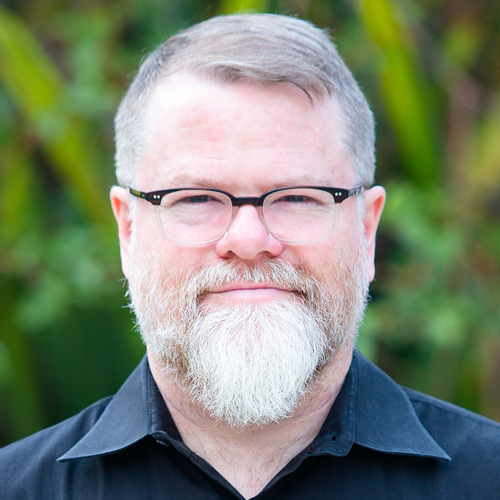Patrick Ball has spent thirty years doing quantitative analysis for truth commissions, non-governmental organizations, international criminal tribunals, and United Nations missions. His work has been conducted in El Salvador, Ethiopia, Guatemala, Haiti, South Africa, Chad, Sri Lanka, East Timor, Sierra Leone, South Africa, Kosovo, Liberia, Perú, Colombia, the Democratic Republic of Congo, and Syria.
Patrick began working in the human rights field in El Salvador in 1991. From 1993 to 2003, he worked in several capacities in the Science and Human Rights Program at the American Association for the Advancement of Science, where he began recruiting colleagues to build HRDAG. While working on human rights cases in Guatemala during the late 1990s, Patrick worked with partners to adopt strong cryptography to protect witnesses. From 2003 to 2013, he was Vice President for Human Rights Programs and the Chief Scientific Officer at Benetech, a nonprofit technology company in Silicon Valley. While at Benetech, he helped to develop Martus, a free, open source software application that allows users anywhere in the world to securely gather and organize information about human rights violations. From 2013 through 2015, Patrick was Executive Director of HRDAG; on December 1, 2015, he became HRDAG’s Director of Research.
Expert testimony
Patrick provided testimony in two cases at the International Criminal Tribunal for the former Yugoslavia, the first in the trial of Slobodan Milošević, the former President of Serbia. He provided technical advice to the Special Court in Sierra Leone and the International Criminal Court.
In 2013 he provided expert testimony in Guatemala’s Supreme Court in the trial of General José Efraín Ríos Montt, the de-facto president of Guatemala in 1982-1983. Gen. Ríos Montt was found guilty of genocide and crimes against humanity; it was the first time ever that a former head of state was found guilty of genocide in his own country.
In September 2013, Patrick Ball testified in a Guatemalan court in the trial of Colonel Héctor Rafael Bol de la Cruz for the 1984 kidnapping and disappearance of Fernando Garcia, a student union leader. He was convicted and sentenced to 40 years in prison. (UN Dispatch. National Security Archive.)
In September 2015, Patrick provided expert testimony in the trial of former President of Chad, Hissène Habré. In May 2016, the court found Habré guilty and sentenced to life in prison in Dakar, Senegal, where he was tried. He is the first former head of state to be tried and found guilty of crimes against humanity in one country (Chad) by the courts of another country (Senegal).
In March 2018, Patrick Ball testified in the re-trial of General José Efraín Ríos Montt and the re-trial of chief of military intelligence José Mauricio Rodríguez Sánchez for the crimes of genocide and crimes against humanity against the Maya Ixil population. In a split decision, Rodríguez Sánchez was acquitted. Ríos Montt died less than a month after the re-trial, in April 2018, and the court closed the case against him.
Awards and honors
In 2024, the Nature Awards John Maddox Prize, in partnership with Sense About Science, awarded Patrick Ball with the John Maddox Prize for his outstanding work in identifying, cataloguing and prosecuting war crimes using rigorous statistical and mathematical modeling.
In 2018, the American Statistical Association gave Patrick the Karl E Peace Award for Outstanding Statistical Contributions for the Betterment of Society.
In 2015, the Claremont Graduate University awarded Patrick a Doctor of Science (honoris causa).
In 2014, Patrick was elected a Fellow of the American Statistical Association.
In 2005, the Electronic Frontier Foundation awarded Patrick their Pioneer Award.
In June 2004, the Association for Computing Machinery (ACM) gave him the Eugene Lawler Award for Humanitarian Contributions within Computer Science and Informatics, and in 2002, he received a Special Achievement Award from the Social Statistics Section of the American Statistical Association.
He is on the Advisory Council of Security Force Monitor, a project of the Columbia Law School Human Rights Institute ; a Fellow at the Human Rights Center at Berkeley Law of the University of California-Berkeley; a member of the Advisory Council of Physicians for Human Rights; and a Research Fellow at Carnegie Mellon’s Center for Human Rights Science. He has been profiled by Pacific Standard, The New York Times Magazine, Wired, Foreign Policy, Salon.com, and the Christian Science Monitor, and he has been featured in a PBS film.
Patrick received his bachelor of arts degree from Columbia University, and his doctorate from the University of Michigan.
Contact
Follow Patrick on Mastodon. Queries to Patrick should use the Contact Us form.
Selected Articles
How do epidemiologists know how many people will get Covid-19?
Patrick Ball (2020). How do epidemiologists know how many people will get Covid-19? Significance. 09 April 2020.
The Statistics of Genocide
Patrick Ball and Megan Price (2018). The statistics of genocide. Chance (special issue). February 2018.
Violence in Blue
Patrick Ball (2016). Violence in blue. Granta 134: 4 March 2016.
The Case Against a Golden Key
Patrick Ball (2016). The case against a golden key. Foreign Affairs. September 14, 2016.
The Truth of Truth Commissions: Comparative Lessons from Haiti, South Africa, and Guatemala
Audrey Chapman and Patrick Ball. Human Rights Quarterly. 23(4):1-42. 2001
Views to a kill: Exploring the implications of source selection in the case of Guatemalan state terror
1977-1995 C Davenport, P Ball Journal of conflict resolution 46 (3), 427-450
Letter to Phil Zimmerman, founder of PGP
Attesting to how freeware PGP has kept sensitive data safe and saved lives in Guatemala. August 3, 1999.
Affidavit of Patrick Ball in ACLU v Miller
Declaration regarding the need for anonymous electronic communication in human rights work by groups such as Amnesty USA and the Carter Center, both located in Georgia January 24, 1997.

